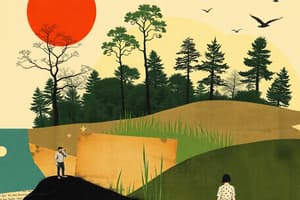Podcast
Questions and Answers
What is succession?
What is succession?
A series of predictable and orderly changes within an ecosystem over time.
What is primary succession?
What is primary succession?
Succession that occurs on surfaces where no soil exists.
What is secondary succession?
What is secondary succession?
Succession following a disturbance that destroys a community without destroying the soil.
What are pioneer species?
What are pioneer species?
What is a climax community?
What is a climax community?
What is ecology?
What is ecology?
What is a biosphere?
What is a biosphere?
What is a biotic factor?
What is a biotic factor?
What is an abiotic factor?
What is an abiotic factor?
What is an organism?
What is an organism?
What is a species?
What is a species?
What does fertile mean?
What does fertile mean?
What does sterile mean?
What does sterile mean?
What is a population?
What is a population?
What is a community?
What is a community?
What is an ecosystem?
What is an ecosystem?
What is a biome?
What is a biome?
What is a niche?
What is a niche?
What is a habitat?
What is a habitat?
What is competition?
What is competition?
What is a resource?
What is a resource?
What is predation?
What is predation?
What is a predator?
What is a predator?
What is prey?
What is prey?
What is a symbiotic relationship?
What is a symbiotic relationship?
What is mutualism?
What is mutualism?
Give an example of mutualism.
Give an example of mutualism.
What is commensalism?
What is commensalism?
Give an example of commensalism.
Give an example of commensalism.
What is parasitism?
What is parasitism?
What is a parasite?
What is a parasite?
Give an example of parasitism.
Give an example of parasitism.
What is a host?
What is a host?
What is radiant energy?
What is radiant energy?
What is chemical energy?
What is chemical energy?
What is an autotroph?
What is an autotroph?
What is a heterotroph?
What is a heterotroph?
Name three types of organisms that are autotrophic.
Name three types of organisms that are autotrophic.
What is photosynthesis?
What is photosynthesis?
What is chemosynthesis?
What is chemosynthesis?
Flashcards are hidden until you start studying
Study Notes
Ecosystem Basics
-
Succession: Predictable and orderly changes in an ecosystem over time.
-
Primary Succession: Occurs on barren surfaces lacking soil, initiating ecosystem development.
-
Secondary Succession: Follows disturbances that destroy a community but maintain soil integrity.
-
Pioneer Species: Initial organisms that colonize a new environment during primary succession.
-
Climax Community: A stable and mature ecological state, no longer undergoing significant changes.
-
Ecology: The study of interactions among organisms and their interactions with the environment.
-
Biosphere: Encompasses all areas of Earth where life exists, from 11 km below sea level to 8 km above.
-
Biotic Factors: Any living components in an ecosystem, such as animals, plants, and microorganisms.
-
Abiotic Factors: Non-living physical aspects of the environment, including water, sunlight, soil, and minerals.
-
Organism: Any individual life form, such as a single deer.
-
Species: Groups of organisms capable of interbreeding and producing fertile offspring.
-
Fertile: Describes individuals or species capable of reproduction.
-
Sterile: Refers to individuals or species unable to reproduce.
-
Population: A collection of individuals from the same species living simultaneously in a specific area, like a herd of deer.
-
Community: Various populations of different species occupying the same environment at once, e.g., deer, bunnies, and squirrels in a forest.
-
Ecosystem: The combination of living organisms and their physical environment, such as a forest ecosystem.
-
Biome: A larger ecological area characterized by specific climate conditions and distinct plant and animal communities, e.g., deserts and taigas.
-
Niche: The role or function of an organism within its ecosystem, including its behavior and its interactions with other organisms.
-
Habitat: The specific environment where an organism resides, such as a bear's den.
-
Competition: Occurs when organisms vie for the same resources within a shared area, for example, birds competing for food.
-
Resource: Essential life necessities including food, water, shelter, oxygen, space, and nutrients.
-
Predation: A biological interaction where one organism hunts another for food, such as a cat that eats a mouse.
-
Predator: The hunter in a predation relationship, examples include lions and spiders.
-
Prey: The organism that is hunted and consumed, such as crickets or zebras.
-
Symbiotic Relationship: Interactions between two different species, influencing both organisms’ survival.
-
Mutualism: A symbiotic relationship in which both species benefit, e.g., bees pollinating flowers while obtaining nectar.
-
Commensalism: A type of symbiosis where one organism benefits and the other is neither helped nor harmed, such as remoras attaching to sharks.
-
Parasitism: A relationship where one organism benefits at the expense of another, causing harm.
-
Parasite: An organism that sustains itself by feeding off a host, e.g., ticks or fleas.
-
Host: An organism that provides sustenance to a parasite, such as a dog or cat.
-
Radiant Energy: Energy derived from sunlight, the original source of energy for ecosystems.
-
Chemical Energy: Energy stored in food that organisms utilize for metabolic processes.
-
Autotroph/Producer: Organisms that independently produce their own food, primarily using photosynthesis, including plants, some bacteria, and algae.
-
Heterotroph/Consumer: Organisms that must consume other living entities for energy.
-
Photosynthesis: The process by which plants convert sunlight into chemical energy to make food.
-
Chemosynthesis: Conversion of inorganic compounds into organic food molecules by specific bacteria, often in extreme environments.
Studying That Suits You
Use AI to generate personalized quizzes and flashcards to suit your learning preferences.





